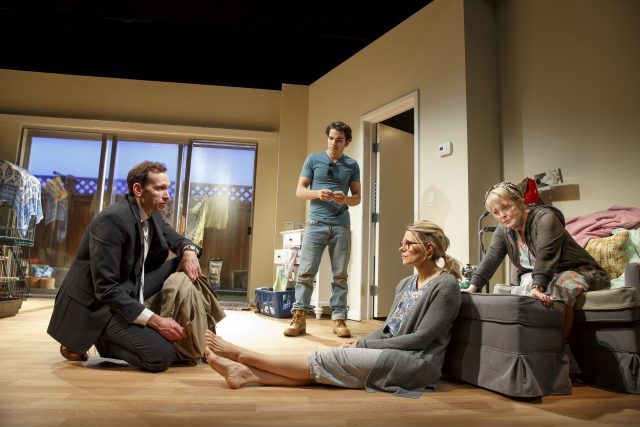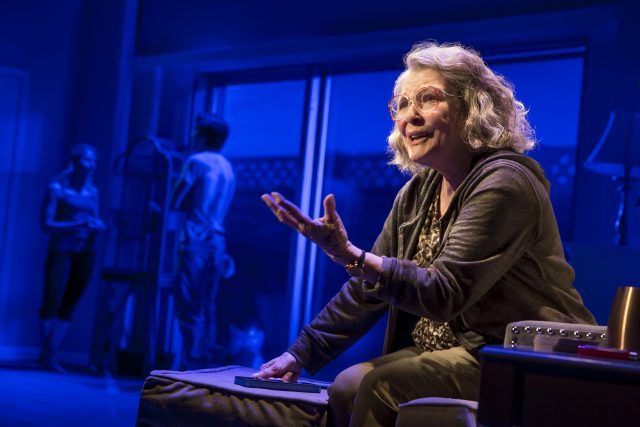
Bruce Norris’s A Parallelogram explores time travel and potential tragedy (photo by Joan Marcus)
2econd Stage Theatre
Tony Kiser Theatre
305 West 43rd St. between Eighth & Ninth Aves.
Through August 20, $37-$109
2st.com
2econd Stage follows up its poignant New York premiere of Pulitzer Prize winner Tracey Letts’s 2003 Man from Nebraska with the superb New York premiere of Pulitzer Prize winner Bruce Norris’s 2010 A Parallelogram, continuing at the Tony Kiser Theatre through August 20. “If you knew in advance exactly what was going to happen in your life, and how everything was going to turn out, and if you knew you couldn’t do anything to change it, would you still want to go on with your life?” thirty-five-year-old Bee (Celia Keenan-Bolger) asks her boyfriend, the married fortysomething Jay (Stephen Kunken), adding, “What if it turned out to be for the best if we’d never even existed?” It’s a classic science-fiction trope, handled with unique flair by Norris, director Michael Greif, and a strong cast of four. Celia Keenan-Bolger stars as the conflicted Bee, a Rite Aid regional manager who is apparently being visited by her future self, an older woman (Anita Gillette), identified in the program as Bee 2, who sits on a chair in the front corner of her bedroom, smoking and sardonically dropping hints about what is in store for Bee’s life. Invisible to the rather self-involved Jay, who moved in with Bee after leaving his wife and two children, Bee 2 nevertheless manages to set off quite a battle between the two lovebirds. The virile young JJ (Juan Castano) mows the lawn outside, but he’ll be inside soon, while Bee 2 plays with some kind of high-tech remote that can shift time backward and forward, the stage going dark and lights flashing to signify the movement of time. (The lighting designer is Kenneth Posner.) But the more Bee gets involved with Bee 2, the more Jay grows concerned about her mental health, and the more the audience is drawn into a parallelogram of ideas and questions about chronology, sanity, narrative, and theater itself.

Bee 2 (Anita Gillette) speaks directly with the audience in 2econd Stage production (photo by Joan Marcus)
Norris (Clybourne Park, Domesticated) and Greif (Dear Evan Hansen, Rent) include lots of little clues as to whether Bee is actually in contact with Bee 2 or is imagining it all and is in the midst of a breakdown, from Bee’s proclivity for playing Solitaire on the bed to the placement of a clock and a TV and Jay’s insistence that he can not only smell the smoke but see it, pointing out the drifting trails that evoke the lines that Bee 2 explains circle the planet and meet themselves, resulting in slightly different realities converging. Bee even tells Bee 2 that people can’t smell light or time, as if they just have to have faith, just like the audience must have faith in the magic of theater. The idea of doubling also relates to the two men, who are not accidentally named Jay and JJ and who play key roles in various aspects of Bee’s life. Three-time Tony nominee Keenan-Bolger (The Glass Menagerie, The 25th Annual Putnam County Spelling Bee) is delightful as Bee (previously portrayed by Kate Arrington in Chicago and Marin Ireland in L.A.), a kind of surrogate for the audience as we contemplate whether she is delusional or not; of course, it helps that Tony nominee Gillette (Chapter Two, Moonstruck), who clearly relishes her role, often addresses us directly, but she is a highly unreliable narrator. Tony nominee Kunken (Enron, Frost/Nixon) is terrific as the easy-to-despise Jay, while Castano (Jesus Hopped the ‘A’ Train, Transfer) holds his own as the bilingual JJ. Obie winner Rachel Hauck’s set quickly rotates from ground-floor apartment to hospital room (where Bee 3 makes a subtle Three Stooges reference), with both spaces resembling each other, another instance of doubling, as is the existence of theater in general, something that presumes to re-create real life onstage. A Parallelogram asks some key questions while not offering any concrete answers. There’s a minor slip-up here and there and not every detail holds up to concerted investigation, but we could always grab hold of that remote and try to fix a few holes — but would it really change anything?